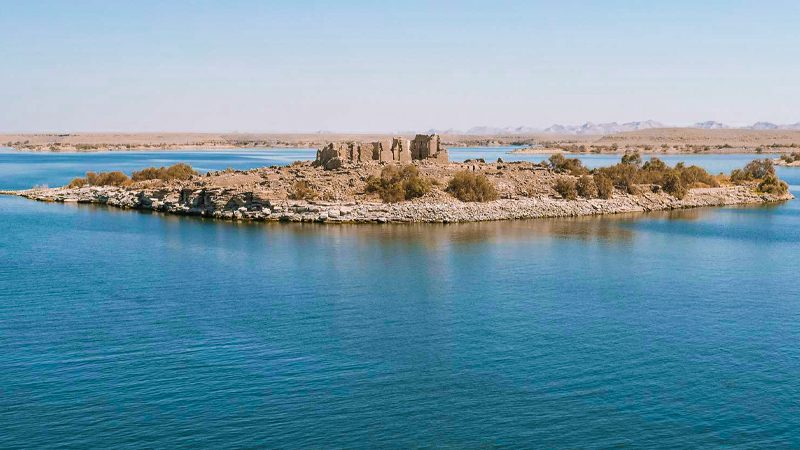Welcome to the enchanting world of Lake Nasser, a sprawling reservoir nestled in the heart of Egypt. Created by the construction of the Aswan High Dam, Lake Nasser stands as a testament to human engineering and offers a mesmerizing blend of natural splendor and rich historical treasures. This comprehensive guide will delve into the scenic wonders, cultural significance, and remarkable attractions that make Lake Nasser a must-visit destination for nature lovers and history enthusiasts alike.


The Formation and Importance of Lake Nasser
Lake Nasser was formed in the 1960s with the completion of the Aswan High Dam, which aimed to control the annual flooding of the Nile River and generate hydroelectric power. This man-made reservoir stretches across southern Egypt and northern Sudan, covering an impressive area of approximately 5,250 square kilometers. Beyond its practical purposes, Lake Nasser has become a haven for biodiversity and a repository of historical sites that would have otherwise been lost beneath its waters.
Exploring the Natural Wonders
Lake Nasser boasts a diverse and stunning natural landscape that captivates visitors. With its crystal-clear turquoise waters framed by majestic desert mountains, the lake offers breathtaking vistas and ample opportunities for relaxation, photography, and water-based activities. Take a boat excursion and immerse yourself in the tranquil ambiance, marveling at the birdlife, fish species, and the ever-changing hues of the sky reflected in the vast expanse of the lake.
Nubian Heritage and Archaeological Marvels
Lake Nasser is renowned for its archaeological significance, as numerous ancient sites were meticulously relocated to higher ground before the dam’s completion. The UNESCO-led project ensured the preservation of historical gems, including the magnificent temples of Abu Simbel. These colossal structures, originally built by Pharaoh Ramses II, now stand proudly on the banks of Lake Nasser, offering visitors a glimpse into Egypt’s ancient past.
Cruising on Lake Nasser
Embarking on a cruise along Lake Nasser is a truly unforgettable experience. From the comfort of a luxurious vessel, travelers can sail across the serene waters, stopping at various points of interest. Cruises often include visits to lesser-known archaeological sites, such as Wadi El Seboua and Kalabsha Temple, allowing guests to immerse themselves in the region’s captivating history and cultural heritage.
Wildlife and Birdwatching
Lake Nasser is a paradise for wildlife enthusiasts and birdwatchers. Its shores and islands provide a haven for a remarkable array of bird species, including migratory birds that visit during certain seasons. Birdwatching excursions offer the opportunity to spot rare and exotic species, such as the Egyptian vulture, pink-backed pelican, and African skimmer, amidst the serene natural backdrop of the lake.
How do I reach Lake Nasser?
Lake Nasser is accessible through various entry points in Egypt. The most common way to reach the lake is by flying into Aswan and then traveling to the lakeshore. Aswan has an international airport with regular flights from Cairo and other major cities. From Aswan, you can join organized tours, hire a private car, or cruise to explore the lake.
Can I go swimming in Lake Nasser?
Yes, swimming is allowed in Lake Nasser. The lake’s calm and clear waters offer a refreshing experience. However, it’s important to note that swimming areas may vary, and some areas might have restrictions due to safety concerns or proximity to archaeological sites. Following any guidelines provided by tour operators or local authorities is recommended for a safe and enjoyable swimming experience.
Are there any specific attractions or historical sites to visit on Lake Nasser?
Yes, Lake Nasser is home to several historical sites and attractions. The most famous are the Abu Simbel Temples, which were relocated to the lake’s banks before the construction of the Aswan High Dam. These temples, dedicated to Pharaoh Ramses II, are a marvel. Other archaeological sites, such as Wadi El Seboua and Kalabsha Temple, can be explored during cruises or guided tours on the lake.
What wildlife can be spotted around Lake Nasser?
Lake Nasser is known for its rich biodiversity and is a haven for wildlife enthusiasts. The lake is home to various bird species, including migratory birds that visit during certain seasons. Some commonly spotted birds include herons, pelicans, eagles, and storks. In addition to birds, you may also spot Nile crocodiles, monitor lizards, and other reptiles along the lake’s shores.
Is it necessary to take a cruise to experience Lake Nasser?
While taking a cruise is a popular way to explore Lake Nasser, it is not the only option. You can also enjoy the lake by visiting specific points of interest, such as Abu Simbel, by land. However, a cruise offers a more comprehensive experience, allowing you to visit multiple sites, enjoy the scenic beauty of the lake, and have a relaxing journey on the water. Choosing an itinerary that aligns with your preferences and time constraints is recommended.
Are there any accommodations available near Lake Nasser?
Yes, there is accommodation available near Lake Nasser. Aswan, the nearest major city, offers various hotels and resorts catering to different budgets and preferences. Also, floating hotels and cruise ships operate on the lake, providing a unique accommodation experience. When planning your trip, consider the location and facilities of the accommodations to ensure a comfortable stay.
Conclusion
Lake Nasser, with its stunning natural beauty, cultural significance, and historical treasures, is a destination that truly captivates the senses. Whether you seek tranquility amidst breathtaking landscapes, a journey through ancient Egypt’s wonders, or encounters with fascinating wildlife, Lake Nasser offers it all. Plan your visit, immerse yourself in the magic of this vast water wonderland, and create memories that will last a lifetime.
